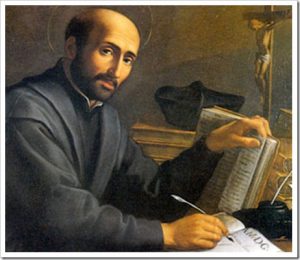 Discernment and the Consciousness Examen
Discernment and the Consciousness Examen
Our lives as Loreto Sisters are influenced by the spirituality of St Ignatius of Loyola and Mary Ward. The essence of this is finding God in all things. It is easy to find God in life when everything is going great and all is wonderful. It’s another story to find God in the messiness of life. It is where we believe the face of God is evident because we believe in a God who became flesh and who is now present and active in the world and in the lives of people in all of their human reality – the shadow and the light. Socrates said that an unreflected life is not worth living. Reflection on life, our actions, choices, in the ordinary everyday events of life and finding the face of God evident in that reality is central to our tradition. Our helpful structure for his reflection is the following. We call it the Consciousness Examen; it is the practice of discernment in the little things of life so that when it comes to bigger things which have to be discerned our awareness is more heightened in order to be able to make a Spirit-filled decision.
Discernment is rooted in the understanding that God is ever at work in our lives – inviting, directing, guiding, drawing us into the fullness of life. Discernment’s central action is reflection on the ordinary events of our lives. It seeks to discover God’s presence in these moments and to follow the direction and guidance God gives us through grace. It is not the events themselves that are of interest, but rather the affective responses they evoke in us – feelings of joy, sorrow, peace, anxiety and all the indefinable ‘somethings’ that arise and stir within us. It is precisely here that through faith we can discover God’s direction and guidance in our lives.
Discernment presupposes several things: that you can reflect on the ordinary events of your life; that you can describe what you experience; that you have a habit of personal prayer; that you know yourself; that you know your deepest desires; that you are open to God and to God’s direction.
We could call the Consciousness Examen a type of mindfulness – being mindful of what is happening, reflecting on our daily lives. The daily Examen takes about 15 minutes. The following points will help you:
Start by asking for the guidance of the Holy Spirit to reflect honestly on your day.
Recall the gifts and blessings of your day, what you are grateful for, and give God thanks.
Reflect on how God has been present in the events, experiences, encounters, and emotions of your day.
How did you meet Jesus in the people and events of your day?
How did God call you to respond in these encounters?
How did you respond to these opportunities and calls that God gave you?
How did you respond to Jesus in the people God put in your path today?
Let God know that you are sorry for the times that you did not respond well to these calls and opportunities.
Reflect on what particular way God is calling you to grow at this time.
Ask for the grace to find Jesus in your experiences and encounters, to hear God’s calls to you tomorrow, and to respond to them.
